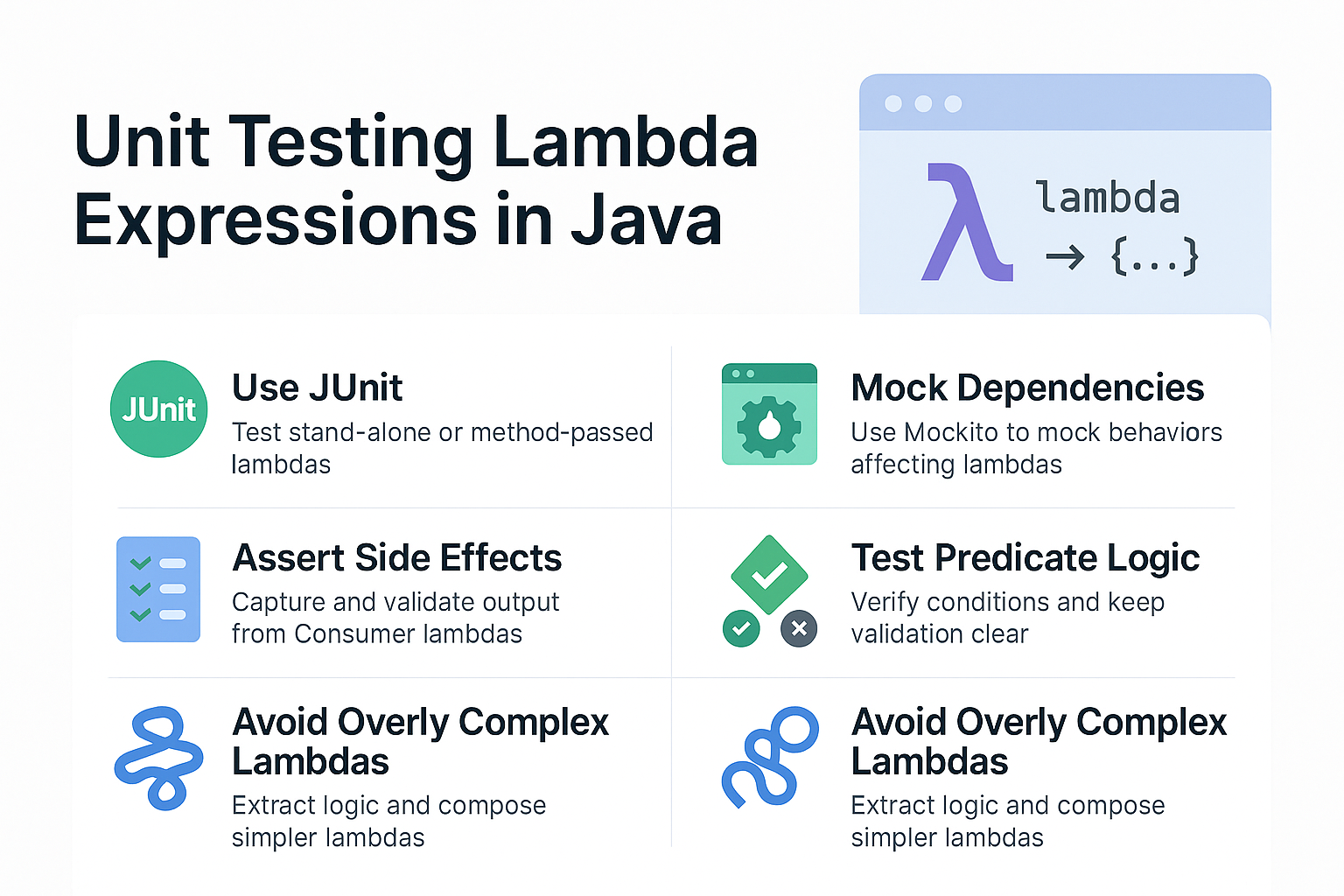Lambda expressions have transformed how we write and structure Java code by enabling functional programming patterns. But with this shift in style comes new challenges in testing these anonymous functions — especially when logic is passed as behavior or stored as variables. This tutorial shows how to unit test lambda expressions in Java using modern techniques and tools like JUnit 5 and Mockito.
We'll cover syntax, integration with functional interfaces, mocking behaviors, testing side effects, and code coverage—all through real-world examples and practical guidance.
What Are Lambda Expressions in Java?
Lambda expressions are anonymous functions introduced in Java 8 that simplify writing instances of functional interfaces. For instance:
Function<String, Integer> stringLength = s -> s.length();
They’re concise, readable, and frequently used in streams, event handling, callbacks, and strategic delegation of logic.
Why Test Lambdas?
Testing lambdas is important because:
- They often encapsulate business logic
- They’re passed as parameters and affect flow
- Bugs in lambdas can be hard to trace
- You need test coverage for logic delegated via lambdas
Core Functional Interfaces in Java
Here's a quick refresher on some common interfaces we’ll be testing:
| Interface | Signature | Use Case |
|---|---|---|
Function<T,R> |
R apply(T t) |
Transformation |
Consumer<T> |
void accept(T t) |
Side-effects (e.g., printing) |
Predicate<T> |
boolean test(T t) |
Filtering/conditions |
Supplier<T> |
T get() |
Deferred value supply |
Runnable |
void run() |
No input/output |
Testing Lambdas: Techniques
1. Using JUnit for Direct Testing
If your lambda is a named variable or method parameter, you can test it like any function.
@Test
void testStringLengthFunction() {
Function<String, Integer> stringLength = s -> s.length();
assertEquals(5, stringLength.apply("Hello"));
}
2. Testing Lambda Passed to a Method
Let’s say you have a service that accepts a lambda:
public void greet(String name, Consumer<String> printer) {
printer.accept("Hello " + name);
}
Your test can pass a mock:
@Test
void testGreetingConsumer() {
Consumer<String> mockPrinter = mock(Consumer.class);
greet("Ashwani", mockPrinter);
verify(mockPrinter).accept("Hello Ashwani");
}
3. Testing Predicates and Composed Lambdas
@Test
void testPredicateComposition() {
Predicate<String> startsWithA = s -> s.startsWith("A");
Predicate<String> endsWithZ = s -> s.endsWith("Z");
Predicate<String> combined = startsWithA.and(endsWithZ);
assertTrue(combined.test("AMAZ"));
}
4. Capturing and Asserting Side Effects
@Test
void testConsumerSideEffect() {
List<String> results = new ArrayList<>();
Consumer<String> collector = results::add;
collector.accept("Collected");
assertEquals(List.of("Collected"), results);
}
📌 What's New in Java 8–21?
- Java 8: Lambdas, Streams,
java.util.function, CompletableFuture - Java 9:
Optional.ifPresentOrElse,Flow API - Java 11+:
varin lambdas - Java 21: Virtual threads support lambdas in structured concurrency
Real-World Applications
- Stream filtering: Testing predicates used in
filter() - Functional configuration: Supplying logic to builders and factories
- Callback APIs: Event-driven lambdas in JavaFX, Spring, or REST clients
Anti-Patterns
- Avoid inline lambdas with too much logic — extract them for testability
- Don't test built-in functional interfaces — test your use of them
- Avoid hard-to-mock lambda fields — inject behaviors when needed
Conclusion and Key Takeaways
- Lambdas are first-class citizens and deserve thorough unit testing
- You can test them just like methods if extracted properly
- Use mocking frameworks and assertions smartly
- Aim for readability and composability in testable lambda code
FAQs – Expert Answers
1. Can I use lambdas for exception handling?
Yes, but handle checked exceptions carefully as lambdas don’t support them directly.
2. What’s the difference between Consumer and Function?
Consumer returns void; Function returns a value.
3. When should I use method references over lambdas?
When the logic is already defined in an existing method and you want cleaner syntax.
4. Are lambdas garbage collected?
Yes, lambdas are objects and are GC'd when out of scope.
5. How does effectively final affect lambda behavior?
Only effectively final variables can be used inside lambda expressions.
6. Can I mock lambda expressions?
Yes, with Mockito you can mock Consumers, Functions, etc.
7. Do lambdas affect test coverage?
Yes, they can. Make sure the logic inside lambdas is covered.
8. Should I log inside lambdas?
Keep lambdas concise—log outside if possible.
9. Can lambdas make testing harder?
Sometimes, especially if deeply nested or overly abstract. Extract when needed.
10. How can I test exceptions in lambdas?
Use assertThrows() for exception-producing lambdas.
